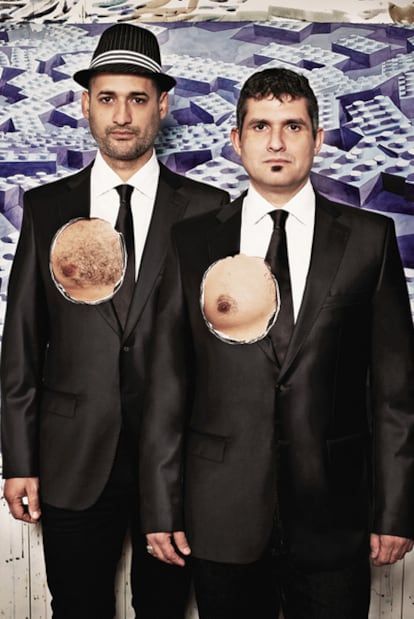Turning 30, Arco art fair debuts sleek new look
Around 200 galleries left out as Carlos Urroz takes charge of Madrid showcase
Arco will survive if it manages to ward off the crisis and get good results. This is the main challenge for Carlos Urroz as he debuts as director of the great Madrid contemporary art fair, now in its 30th year. His formula for success was presented this week to executives of Ifema, the convention center that hosts Arco, which this year runs from February 16 to 20.
Collecting is the focus of this year's event, and 120 collectors from all over the world have been asked to come and get acquainted with the art being sold by 197 galleries in the general exhibition (20 fewer than last year) and the parallel sections. Also noteworthy is that the selection committee has left out some 200 galleries this time round.
This year's guest country is Russia, although it is only represented by eight galleries. Alexander Kutnetsov, the Russian ambassador in Madrid, specified that these galleries come from various parts of the country and not just Moscow or St Petersburg.
Russian contemporary art will be represented by galleries such as the Garage Center for Contemporary Culture, created in Moscow in 2008 by the multimillionaire oil tycoon (and owner of Chelsea soccer club) Roman Abramovich, whose presence is widely anticipated at the official inauguration of the fair.
For collectors with somewhat more limited means, Arco is inaugurating a project called First Collector, which provides aspiring collectors with advice on how to invest in art. Carlos Urroz guaranteed that the team of advisors will be very careful not to recommend specific artists or galleries.
"Their sole mission is to give people a sense of what they can do with a specific amount of money and provide indications as to where they may find such artworks," he said.
Also of note is the fact that parallel cultural events, which played a leading role under former Arco director Lourdes Fernández, have been substantially reduced. The most important event in this section will be a tribute to the fair's 30th anniversary through a review of the artworks that surprised visitors the most over the years.
Observers have taken good note of the fair's evolution- or involution, more recently. "For nearly a couple of decades, Arco enjoyed unexpected prominence in Spain's artistic scene," notes Manuel Borja-Villel, director of the Reina Sofía contemporary art museum.
"More than a fair per se, it has been a cultural reference. Entire generations of schoolchildren got used to seeing contemporary art in its pavilions, and assimilating the fact that new material at the fair represented what was going on in the world."
He goes on to explain how and why the fair has gradually waned, culminating in last year's very public dispute between executives and gallery representatives over who should be deciding what art makes it into Arco.
"Today, Arco is a symptom of the problems facing the Spanish artistic system: lack of visibility, absence of a discourse of its own and a certain degree of affectation," he asserts.
"We were wrong when we thought that infrastructures would by themselves create a cultural discourse and fabric, because the result was the dissolution of public space into the domain of publicity, and the absorption of the artistic aspects by the social ones.
"The stress was on the show value, thinking that figures were an end-all in themselves, but once economic resources started to dwindle, the reality of a very precarious market with a shallow debate level has become patently manifest."

Tu suscripción se está usando en otro dispositivo
¿Quieres añadir otro usuario a tu suscripción?
Si continúas leyendo en este dispositivo, no se podrá leer en el otro.
FlechaTu suscripción se está usando en otro dispositivo y solo puedes acceder a EL PAÍS desde un dispositivo a la vez.
Si quieres compartir tu cuenta, cambia tu suscripción a la modalidad Premium, así podrás añadir otro usuario. Cada uno accederá con su propia cuenta de email, lo que os permitirá personalizar vuestra experiencia en EL PAÍS.
¿Tienes una suscripción de empresa? Accede aquí para contratar más cuentas.
En el caso de no saber quién está usando tu cuenta, te recomendamos cambiar tu contraseña aquí.
Si decides continuar compartiendo tu cuenta, este mensaje se mostrará en tu dispositivo y en el de la otra persona que está usando tu cuenta de forma indefinida, afectando a tu experiencia de lectura. Puedes consultar aquí los términos y condiciones de la suscripción digital.








































